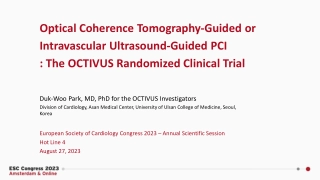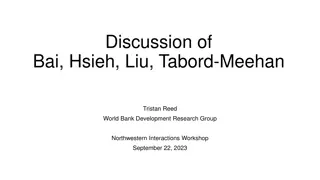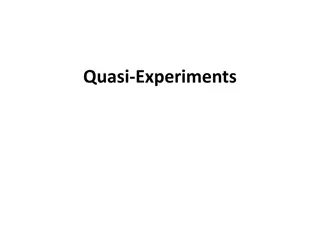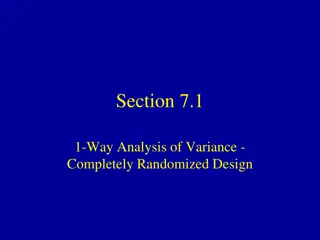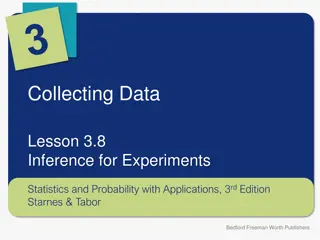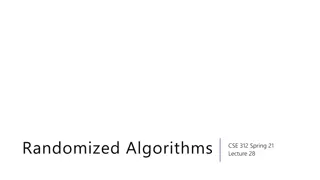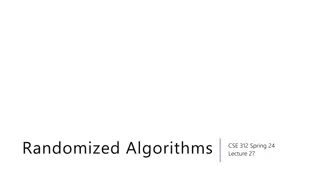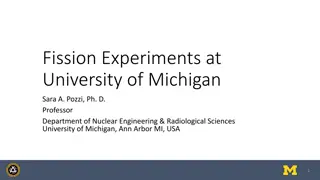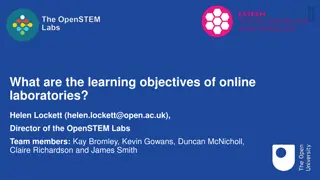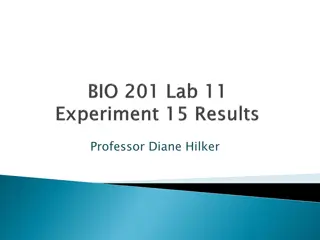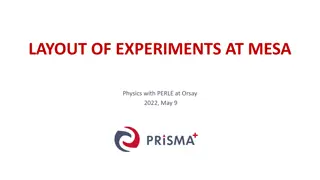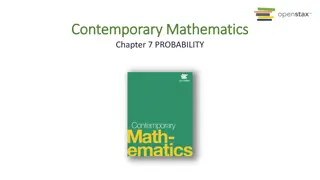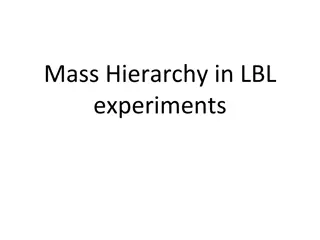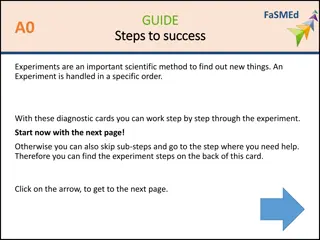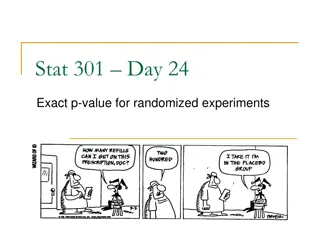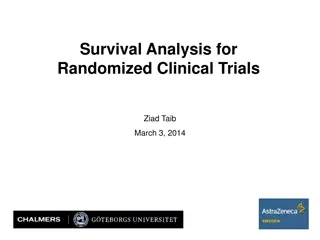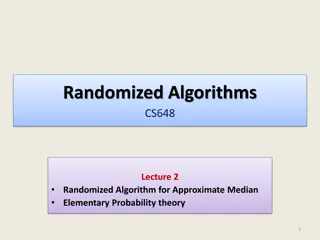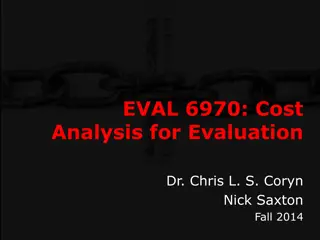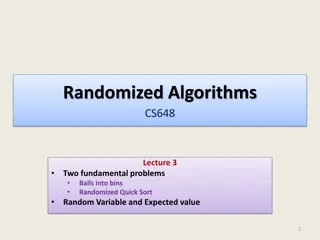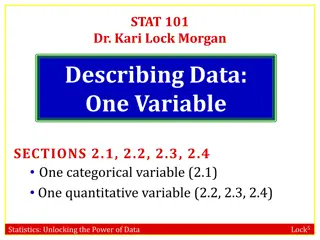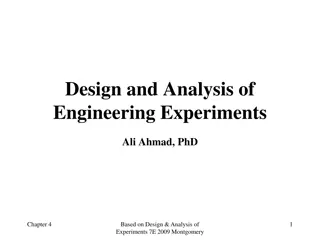OCTIVUS Randomized Clinical Trial: OCT-Guided vs IVUS-Guided PCI
The OCTIVUS Randomized Clinical Trial compared the clinical efficacy and safety of Optical Coherence Tomography (OCT)-guided and Intravascular Ultrasound (IVUS)-guided strategies in patients undergoing PCI for significant CAD. The study aimed to determine if OCT-guided PCI is noninferior to IVUS-gui
13 views • 27 slides
Discussion of Randomized Experiments and Experimental Design Challenges
Randomized experiments face statistical power challenges due to rare outcomes and high variance. Stratifying randomization can help control for correlated residual variance based on baseline values of outcomes. Implications for applied economists include addressing attrition and treatment effect het
3 views • 6 slides
Quasi-Experiments in Research
Quasi-experiments are research studies that resemble experiments but do not involve random assignment of participants to treatment groups. This approach is taken when random assignment is challenging or when ethical considerations come into play. Unlike true experiments, quasi-experiments can provid
6 views • 15 slides
Analysis of Variance in Completely Randomized Design
This content covers the analysis of variance in a completely randomized design, focusing on comparing more than two groups with numeric responses. It explains the statistical methods used to compare groups in controlled experiments and observational studies. The content includes information on 1-way
2 views • 48 slides
Inference for Experiments in Statistics
Learn about inference for experiments in statistics, including completely randomized design, statistical significance, and random assignment to treatments. Discover how to analyze results, determine significance, and interpret differences in responses. Explore the concept through practical applicati
6 views • 10 slides
Randomized Algorithms: Types and Examples
Explore the world of randomized algorithms through types like Las Vegas and Monte Carlo, with a focus on classic examples such as Quick Sort. Learn how randomness plays a crucial role in computation and discover the principles behind these algorithms. Dive into the applications of randomized algorit
3 views • 22 slides
Randomized Algorithms: A Deep Dive into Las Vegas and Monte Carlo Algorithms
Randomized algorithms incorporate randomness into computations, with Las Vegas algorithms always providing the correct answer but varying in time, while Monte Carlo algorithms occasionally give wrong answers. Quick Sort is a classic Las Vegas algorithm that involves pivoting elements for sorting. Ch
7 views • 21 slides
Advanced Fission Experiments at University of Michigan
The University of Michigan, under the guidance of Dr. Sara A. Pozzi, conducts cutting-edge fission experiments leveraging organic scintillation detectors. These detectors offer advantages such as nanosecond-scale response times, energy proportionality, and scalability. The experiments focus on impro
0 views • 4 slides
The Objectives of Online Laboratories in STEM Education
Online laboratories offer interactive experiments over the internet, providing remote and virtual practical experiences in STEM education. The OpenSTEM Labs project aims to explore various activities and outcomes in experiments, focusing on classification schemes and learning objectives. The purpose
2 views • 17 slides
Microbiology Laboratory Experiments Overview
This overview showcases various microbiology laboratory experiments conducted to examine the physiology of bacteria, enzymatic activities, and biochemical reactions. It includes experiments on Phenol Red Dextrose Broth, Phenol Red Lactose Broth, Nitrate Broth, Tryptone Broth, and more. The provided
11 views • 26 slides
Latest Developments in Physics Experiments at MESA Orsay 2022
Developments at MESA include the layout of experiments, status of the 5 MeV Injector, operational modes, fixed target experiments, challenges in the EB-Experiment P2, procurement updates, energy recovery mode in MAGIX, and upcoming spectrometer deliveries. Exciting advancements and projects are unde
1 views • 16 slides
Multi-Stage Probability Experiments
Explore single-stage and multi-stage probability experiments in contemporary mathematics. Learn how to determine sample spaces of experiments using tree diagrams, tables, and outcomes. Discover the concepts of independence and dependence between stages in multi-stage experiments through practical ex
9 views • 18 slides
Insights into Mass Hierarchy Determination in Long-Baseline Neutrino Experiments
Combining appearance probabilities of electron and anti-electron neutrinos in long-baseline experiments can help determine the mass hierarchy, with ongoing experiments collecting significant data by 2020. Analyses point to CP violation possibilities, with updates expected in Neutrino2016. The capabi
4 views • 6 slides
Steps to Success: Conducting Scientific Experiments
Scientific experiments play a crucial role in discovering new things. Follow a specific order of steps outlined in the guide to successfully conduct experiments. Begin by understanding biological phenomena, formulating hypotheses, planning, performing experiments, observing results, and drawing conc
3 views • 29 slides
Exact P-Value for Randomized Experiments and Quiz/HW Feedback
In this Day 24 session of Stat 301, exact p-values for randomized experiments were calculated in Investigation 3.6 Questions (a) - (f). The completion of both Section 1 and Section 2 of this investigation is noted. Additionally, comments on a quiz or homework assignment were provided.
4 views • 16 slides
Survival Analysis in Clinical Trials
Survival analysis plays a crucial role in analyzing data from randomized clinical trials, observational studies, and experiments. It involves estimating the survival function, conducting the log-rank test, and identifying when to use this analytical approach. Elements of survival experiments, standa
4 views • 73 slides
Randomized Algorithms for Approximate Median with Elementary Probability
This content covers a lecture on a randomized algorithm for finding an approximate median element using elementary probability theory. It discusses the importance of insight and basic probability in designing and analyzing such algorithms. The lecture presents a simple probability exercise involving
5 views • 25 slides
Cost Analysis for Evaluation: Strategies and Methods
This document delves into the realm of cost-effectiveness analysis for evaluation purposes, emphasizing the significance of defining measures of effectiveness, distinguishing intermediate versus final outcomes, establishing effectiveness through causal analysis, and exploring different types of rese
2 views • 21 slides
The Power of Experiments: Learnings from Obama's Million Dollar Campaign
Businesses, governments, and campaigns like Obama's use experiments to make data-driven decisions. Discover how a simple experiment helped Obama raise $60 million, emphasizing the significance of randomized controlled experiments and real-world examples in optimizing outcomes.
4 views • 28 slides
Randomized Algorithms
Concept of Balls into Bins in randomized algorithms, focusing on calculating probabilities of specific events and understanding the probability space. Theoretical theorems and experiments are discussed to analyze the occurrence of empty bins.
3 views • 34 slides
CS 121: Lecture 24 Intro to Randomized Algorithms
Dive into a world of Randomized Algorithms with Professor Adam Hesterberg at Harvard University. Explore topics such as Polynomial Identity Testing, Approximation for Maximum Cut, and Properties of Randomized Computation in this informative lecture series. Discover different views on Randomized Algo
1 views • 28 slides
Randomized Algorithms
Exploring the Partition Theorem and Find-Min algorithm in the context of randomized incremental construction. Understand how to apply the theorem effectively and solve complex problems magically. Dive into the closest pair of points problem with deterministic and randomized algorithms. This content
4 views • 20 slides
Describing Data: One Variable - Categorical and Quantitative Examples
The concepts of categorical and quantitative variables in statistics. Learn about the importance of randomization in data collection and the distinction between random samples and randomized experiments. Understand when to use random sampling and randomized experiments for different study objectives
1 views • 59 slides
Randomized Algorithms
Randomized algorithms provide efficient solutions to complex problems by leveraging randomness. From finding global minimum cuts to exploring distributed algorithms, this lecture series delves into the realm of randomized complexity classes. Through examples and discussions on differential privacy a
5 views • 21 slides
Design and Analysis of Engineering Experiments: A Comprehensive Overview
This content delves into the fundamental principles and historical evolution of engineering experiments, highlighting their significance in process characterization, material evaluation, and product development. It explores the impact of notable figures like W.S. Gossett, R.A. Fisher, and George E.P
1 views • 15 slides
Randomized Communication Complexity in Complexity Theory
Explore the concepts of communication complexity, deterministic and randomized protocols, and error probabilities in computing functions within the realm of complexity theory. Dive into the nuances of randomized communication protocols and their effectiveness in solving problems with minimal communi
2 views • 16 slides
Analyzing Randomized Algorithms and QuickSort
Explore the concepts of randomized algorithms, including QuickSort, and learn how to measure their runtime and performance. Discover the significance of Las Vegas algorithms and delve into sorting algorithms like BogoSort. Dive into understanding the analysis of randomized algorithms and their pract
3 views • 43 slides
Exploring Randomized Algorithms in CS648 and Examples
Discover the world of randomized algorithms in CS648, including the definition, structure, and examples like Approximate Median and Randomized QuickSort. Dive into the concepts, motivations, and running times of both deterministic and randomized algorithms, gaining insights into the fascinating real
4 views • 24 slides
Behavioral Experiments on Biased Voting in Networks by Qian Zou
This study presents behavioral experiments on biased voting in networks, analyzing conflict on individual preferences and collective unity in decision-making groups. The methodology, experimental design, results, and conclusions are discussed, focusing on factors influencing individual choices and b
1 views • 20 slides
Causal Studies and Randomized Experiments Overview
Explore the design and analysis of causal studies with randomized experiments led by Dr. Kari Lock Morgan and Dr. Fan Li at Duke University. Dive into covariates, assignment mechanisms, and creating balanced treatment groups for estimating causal effects. Understand classical randomized experiments
7 views • 24 slides
Preliminary Results on LAA/Wi-Fi Coexistence Experiments
This document presents preliminary results from experiments studying the coexistence of LAA and Wi-Fi in different scenarios. The experiments reveal the impact of LAA operation on ambient Wi-Fi usage and the challenges faced by Wi-Fi clients in coexisting environments. Detailed experiments, includin
4 views • 10 slides
Applications and Insights into Randomized Algorithms
Discover the application of fingerprinting techniques and 1-dimensional pattern matching in randomized algorithms. Learn about designing randomized algorithms based on random ideas, insight into problems, and the role of randomization in materializing ideas. Explore topics such as Randomized Quick S
7 views • 35 slides
Design and Analysis of Engineering Experiments with Blocking Factors
Explore the concept of blocking factors in engineering experiments, including the use of randomized complete block design, nuisance factors, and the importance of blocking to minimize variability. Learn how blocking techniques can help manage uncontrollable factors and improve experimental outcomes.
2 views • 27 slides
Randomized Algorithms - Lecture Insights
Uncover the intricacies of randomized algorithms in this lecture series, covering topics ranging from 2-SAT and 3-SAT to Probabilistic Turing Machines and language recognition. Delve into complexity classes like BPP, ZPP, and RP, exploring decision problems and strong vs. weak BPP scenarios. Engage
2 views • 14 slides
Introduction to Probability Experiments and Counting Rules
The session delves into probability experiments, counting rules, assigning probabilities to events, and exploring basic relationships in probability theory. It discusses uncertainties in decision-making, the essence of probability as a numerical measure, and statistical experiments. Learn about expe
1 views • 9 slides
Advanced Algorithms: Randomized Algorithms and Computation Techniques
Explore randomized algorithms for computing in advanced algorithms class. Learn about approximating, verifying, and calculating using randomized methods. Dive into estimating the area of a unit disk with precision. Discover applications of Chernoff bound for analysis and error estimation.
1 views • 27 slides
Randomized Subexponential Algorithms in Games on Graphs
Explore the concept of randomized subexponential algorithms in the context of games on graphs, touching on strategy iteration, values, sum of values, and strategy improvement algorithms. The discussion includes Switch-All algorithm, Randomized algorithms for LP-type problems, and Recursive Random Ac
4 views • 22 slides
Randomized Phase II Workshop: Design Review and Trial Proposals
Delve into the classification and critique of randomized phase II trial designs, focusing on a concept in head and neck cancer. Explore the ongoing CCTG HN 9 study and its utilized trial design. Understand the defining characteristics, statistical frameworks, and classification of randomized phase I
1 views • 13 slides
Computational Geometry Lecture Notes and Randomized Linear Programming Overview
Explore lecture notes on computational geometry and randomized linear programming, covering topics like random permutations, backward analysis of running time, and algorithm modifications. Learn about avoiding worst-case scenarios, generating random permutations, and analyzing the running time of ra
3 views • 22 slides
Understanding Randomized Complete Block Design (RCBD)
Learn about Randomized Complete Block Design (RCBD), a statistical design used in experiments to reduce variation among experimental units. Discover how blocks, fixed and random effects, missing value imputation, and power analysis play crucial roles in RCBD experiments.
3 views • 8 slides
